
The 1964 United States presidential election was the 45th quadrennial presidential election. It was held on Tuesday, November 3, 1964. Incumbent Democratic President Lyndon B. Johnson defeated Republican Senator Barry Goldwater in a landslide victory. Johnson was the fourth and most recent vice president to succeed the presidency following the death of his predecessor and win a full term in his own right. Johnson won the largest share of the popular vote for the Democratic Party in history, 61.1%, and the highest for any candidate since the advent of widespread popular elections in 1824.

The 1968 United States presidential election was the 46th quadrennial presidential election, held on Tuesday, November 5, 1968. The Republican nominee, former vice president Richard Nixon, defeated both the Democratic nominee, incumbent vice president Hubert Humphrey, and the American Independent Party nominee, former Alabama governor George Wallace. This was the last election until 1988 in which the incumbent president was not on the ballot. This is the most recent election where a third-party candidate won a state.

The 1972 United States presidential election was the 47th quadrennial presidential election held on Tuesday, November 7, 1972. Incumbent Republican president Richard Nixon defeated Democratic U.S. senator George McGovern in a landslide victory. With 60.7% of the popular vote, Richard Nixon won the largest share of the popular vote for the Republican Party in any presidential election.
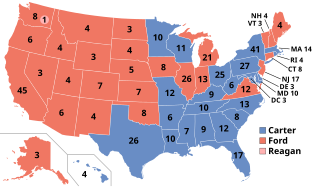
The 1976 United States presidential election was the 48th quadrennial presidential election, held on Tuesday, November 2, 1976. Democrat Jimmy Carter, former Governor of Georgia, defeated incumbent Republican president Gerald Ford in a narrow victory. This was the first presidential election since 1932 in which the incumbent was defeated, as well as the only Democratic victory of the six presidential elections between 1968 and 1988.
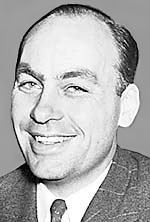
George Horace Gallup was an American pioneer of survey sampling techniques and inventor of the Gallup poll, a successful statistical method of survey sampling for measuring public opinion.

Gallup, Inc. is an American multinational analytics and advisory company based in Washington, D.C. Founded by George Gallup in 1935, the company became known for its public opinion polls conducted worldwide. Gallup provides analytics and management consulting to organizations globally. In addition the company offers educational consulting, the CliftonStrengths assessment and associated products, and business and management books published by its Gallup Press unit.

The Fifth Party System, also known as the New Deal Party System, is the era of American national politics that began with the election of Franklin D. Roosevelt to President of the United States in 1932. Roosevelt's implementation of his popular New Deal expanded the size and power of the federal government to an extent unprecedented in American history, and marked the beginning of political dominance by the Democratic Party that would remain largely unbroken until 1952. This period also began the ideological swapping of Democrats and Republicans into their modern versions, largely due to most Black voters switching from the Republican Party to the Democratic Party, while most conservative, White, usually southern Democrats shifted to the Republican Party as Democrats began increasingly prioritizing civil rights; this process accelerated into the 1960s. The Fifth Party System followed the Fourth Party System, also known as the Progressive Era, and was itself followed by the Sixth Party System.

George Romney ran for the 1968 Republican Party nomination in the 1968 United States presidential election.
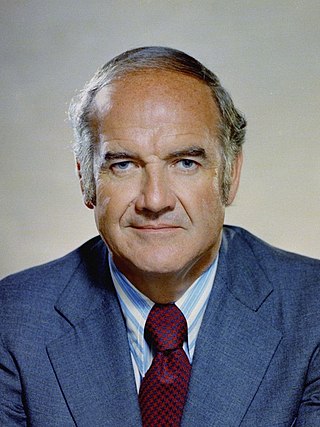
From January 24 to June 20, 1972, voters of the Democratic Party chose its nominee for president in the 1972 United States presidential election. Senator George McGovern of South Dakota was selected as the nominee through a series of primary elections, caucuses, and state party conventions, culminating in the 1972 Democratic National Convention held from July 10 to July 13, 1972, in Miami, Florida.
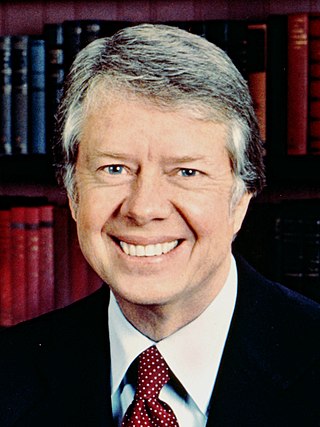
From January 27 to June 8, 1976, voters of the Democratic Party chose its nominee for president in the 1976 United States presidential election. Former Georgia governor Jimmy Carter was selected as the nominee through a series of primary elections and caucuses culminating in the 1976 Democratic National Convention held from July 12 to July 15, 1976, in New York City.
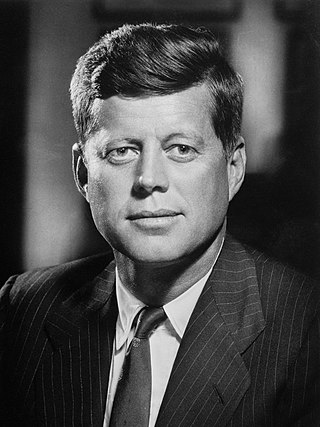
From March 8 to June 7, 1960, voters and members of the Democratic Party elected delegates to the 1960 Democratic National Convention through a series of caucuses, conventions, and primaries, partly for the purpose of nominating a candidate for President of the United States in the 1960 election. The presidential primaries were inconclusive, as several of the leading contenders did not enter them, but U.S. Senator John F. Kennedy of Massachusetts emerged as the strongest candidate and won the nomination over Lyndon B. Johnson at the convention, held from July 11 to 15 at the Los Angeles Memorial Sports Arena.

From March to July 1968, Democratic Party voters elected delegates to the 1968 Democratic National Convention for the purpose of selecting the party's nominee for president in the upcoming election. After an inconclusive and tumultuous campaign focused on the Vietnam War and marred by the June assassination of Robert F. Kennedy, incumbent Vice President Hubert Humphrey was nominated at the 1968 Democratic National Convention held from August 26 to August 29, 1968, in Chicago, Illinois.

From March 12 to June 11, 1968, voters of the Republican Party chose its nominee for president in the 1968 United States presidential election. Former vice president Richard Nixon was selected as the nominee through a series of primary elections and caucuses culminating in the 1968 Republican National Convention held from August 5 to August 8, 1968, in Miami Beach, Florida.

The 1968 presidential campaign of Hubert Humphrey began when Vice President of the United States Hubert Humphrey of Minnesota decided to seek the Democratic Party nomination for President of the United States following President Lyndon B. Johnson's announcement ending his own bid for the nomination. Johnson withdrew after an unexpectedly strong challenge from anti-Vietnam War presidential candidate, Senator Eugene McCarthy of Minnesota, in the early Democratic primaries. McCarthy, along with Senator Robert F. Kennedy of New York, became Humphrey's main opponents for the nomination. Their "new politics" contrasted with Humphrey's "old politics" as the increasingly unpopular Vietnam War intensified.

The 1968 presidential campaign of Richard Nixon, the 36th vice president of the United States, began when Nixon, the Republican nominee of 1960, formally announced his candidacy, following a year's preparation and five years' political reorganization after defeats in the 1960 presidential election and the 1962 California gubernatorial election.

The 1968 United States presidential election in South Carolina took place on November 5, 1968. All 50 states and the District of Columbia were part of the 1968 United States presidential election. South Carolina voters chose 8 electors to the Electoral College, who voted for president and vice president.
This article provides a list of scientific, nationwide public opinion polls that were conducted relating to the 1936 United States presidential election.
This article provides a list of scientific, nationwide public opinion polls that were conducted relating to the 1940 United States presidential election.
This article provides a list of scientific, nationwide public opinion polls that were conducted relating to the 1972 United States presidential election.
This article provides a list of scientific, nationwide public opinion polls that were conducted relating to the 1976 United States presidential election.















